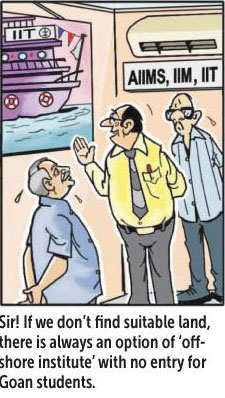18 Oct 2017 | 04:52am IST
Wagh’s fidelity to Shudras exasperate some
The order of the Government of cancelling the literary awards both in the Marathi section and Konkani section has not created a major stir in literary circles as the situation warranted. The government has no business to be in the business of giving or withdrawing literary awards. Even the opposition party is yet to question the Chief Minister. The Goa Konkani Academy and the Goa Marathi Academy are autonomous bodies who were expected to take independent decisions in such matters. The reference to the Chief Minister is a clear abdication of responsibility and surrender of autonomy.
The controversy was over ‘Sudhir–Sukta’ an anthology of poems by Vishnu Wagh being selected to get the Konkani Academy Award. The Academy appointed experts who in their wisdom chose Wagh’s anthology for the award but in a move unheard of, one expert who probably was in a minority in the selection committee went public condemning the choice of the majority. It is very clear that this gentleman was unable to convince the majority of his point of view. Even in the Highest Court of the land, decisions are taken by majority. There will be any number of decisions where even the Chief Justice of India is unable to convince the majority. Majority has to give way to majority view.
The attack on the book comes on two major issues, certain poems use foul and slang language and secondly the book is directed against the Brahmin community. Individuals claiming all the wisdom of the language have condemned the book on merit but it must be presumed that experts appointed by the Goa Konkani Academy have gone into that.
The book is in circulation from 2013 and is now out of print. It did not attract penal offence under 295A of the Indian Penal code, neither was the book banned under sec. 94 of the Criminal Procedure code. All admit that the book deals with the pangs of the exploited lower classes, but certain portions have vulgar language. The criticism is more to do with the persona of now defenceless Vishnu Wagh, than the merit of his work. His first love for Marathi has also, lot to do with the controversy.
Last week the Supreme Court refused to ban Dalit writer Kancha Ilaiah’s Book ‘Samajika Smuggluru Komatullu’ (Vysyas - social smugglers) at the instance of the targeted community i.e. the Arya Vyasa Community which the writer claimed to be meat eaters and agriculturists. The preface of the original book said “My appeal to Brahmanic readers is that if they want to read this book they must read it without self-righteousness or self-pity. As they begin to read it, it may generate a warlike situation in their minds which are trained in Brahmanic thought….”. Despite this, the court asserted the writer’s fundamental right of speech and expression. A writer’s views can certainly be challenged. After all it is his view!
A novel ‘Prajapati’ in West Bengal intended to expose social evils prevailing in our society was subject matter of a Supreme Court judgment in 1986 over emphasis on sex and use of slang and unconventional language in the novel. The court adjudged no obscenity despite description of female bodies, narrations of feelings, thoughts and action in vulgar language. “Some portion of the book may appear to be vulgar and readers of cultured and refined taste may feel shocked,” the court stated. The court went on “because of the language used, the episodes in relation to sex life narrated in the novel, appear vulgar and may create a feeling of disgust and revultion…”, but it is up to the readers of experience and maturity to draw necessary inference. The court went further ‘if a reference to sex by itself in any novel is considered to be obscene and not fit to be read by adolescents, adolescents will not be in a position to read any novels and “will have to read books which are purely religious”.
The Booker award winning ‘The God Of Small Things’ by Arundhati Roy had a paragraph “the line of down that led from her navel to her dark triangle, that told him where she wanted him to go… the carpenter’s hands lifted his lips and an untouchable tongue touched the innermost part of her. Drank long and deep from the bowl of her. She danced for him. On that boat-shaped piece of earth she lived”. It was this paragraph that received the summons from a magistrate in Kerala. Her defence was loud and clear. That para is actually denouement of the pulsating narrative where the lower caste velunthe couples with the protagonist ‘Ammu’ in the novel which deals with the upheaval in a feudal Syrian Christian house hold of Kottayam. ‘A dark triangle’, ‘quivering hips’ and ‘the inside of the legs’ may have woven stories in large number of novels which became best sellers and each considered not obscene in the circumstances.
The question of test of vulgarity is whether it depraves and corrupts those who are open to such influences. That is the test for Vishnu Wagh’s anthology. He is not just another writer. He is a giant in Marathi literature. Wagh, it appears has annoyed a section and has confused some by his ‘we v/s. them’ language, so very close to that of dalit writer Namdev Dhasal. The book has brought out his fidelity to the ‘Shudras’. The preface makes it clear. It is his mind and heart and may be also art that the majority in the expert committee Goa Konkani Academy selected his anthology of poems.
(The writer is practising advocate, senior faculty in law and political analyst)
